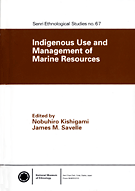Senri Ethnological Studies (SES)
 No.67 Indigenous Use and Management of Marine Resources
No.67 Indigenous Use and Management of Marine Resources
2005年2月18日刊行
Edited by Nobuhiro Kishigami, James M. SaveEle
バックナンバー
刊行の目的および意義
国立民族学博物館の先端民族学研究プロジェクトのひとつとして、1998年度から2003年度まで「先住民資源問題」が実施された。編者のひとりである岸上は「先住民による海洋資源の利用、管理、流通」をテーマとして共同研究会や科研調査を組織し実施した。そして成果の検討と公開を目的として2002年12月2日から6日にかけて国内外から約20名の第1線で活躍している研究者を招へいし、「平成14年度文部科学省国際シンポジウム New Interdiscriplinary Approaches to the Study of Indigenous Use and Management of Migratory Marine Resources」を実施した。本論文集は、そのシンポジウムの成果をとりまとめたものである。
これまで人類学は陸地の諸文化に重点を置き、沿岸部や島嶼部の海や沿岸域に生活の基盤を持つ諸文化を正面から研究することはほとんどなかった。かりにそのような研究が存在したとしても、秋道らによる一部の例外を除けば、漁民の生活や漁労活動、漁村の社会構造や宗教に関する民族誌的な研究であった。一方、本論文集は、極北地域や太平洋地域、東南アジア地域、西インド洋、カリブ海域における先住民や漁民による水産資源の利用と管理に関する諸問題を学際的な視点から取り扱っている。さらに水産資源のコモンズ論、先住民捕鯨をめぐる諸問題、気候の温暖化が水産資源利用へ及ぼした諸影響、環境汚染の水産資源への諸影響、海域に関する先住民権の問題、伝統的な環境知識と科学的な環境知識の問題など、これまであまり取り上げられてこなかった研究分野の論文が所収されている。本論文集は、これまでの研究と比べるとより応用的な研究であり、かつ水産資源の利用と管理に関する最先端の研究成果であるといえる。
これまで人類学は陸地の諸文化に重点を置き、沿岸部や島嶼部の海や沿岸域に生活の基盤を持つ諸文化を正面から研究することはほとんどなかった。かりにそのような研究が存在したとしても、秋道らによる一部の例外を除けば、漁民の生活や漁労活動、漁村の社会構造や宗教に関する民族誌的な研究であった。一方、本論文集は、極北地域や太平洋地域、東南アジア地域、西インド洋、カリブ海域における先住民や漁民による水産資源の利用と管理に関する諸問題を学際的な視点から取り扱っている。さらに水産資源のコモンズ論、先住民捕鯨をめぐる諸問題、気候の温暖化が水産資源利用へ及ぼした諸影響、環境汚染の水産資源への諸影響、海域に関する先住民権の問題、伝統的な環境知識と科学的な環境知識の問題など、これまであまり取り上げられてこなかった研究分野の論文が所収されている。本論文集は、これまでの研究と比べるとより応用的な研究であり、かつ水産資源の利用と管理に関する最先端の研究成果であるといえる。
Contents
1. Genaral Introduction: Marine Resources and Anthropology
Nobuhiro Kishigami and James M. Savelle
Part 1 Overview: Theoretical and Empirical Consideration
2. Commons Theory for Marine Resource Management in a Complex World
Fikret Berkes
3. Folk Management and Conservation of Marine Resources:
Towards a Theoretical and Methodological Assessment
Towards a Theoretical and Methodological Assessment
Richard B. Pollnac and Jeffery C. Johnson
Part 2 Indigenous and Commercial Whaling
4. The Development of Indigenous Whaling: Prehistoric and Historic
James M. Savelle
5. "Just One More Time before I Die": Securing the Relationship between Inuit and Whales in the Arctic Regions
Milton M. R. Freeman
6. Indigenous Use and Management of Whales and Other Marine Resources in East Flores and Lembata, Indonesia
Robert H. Barnes
7. Use and Management of Humpback Whales in Bequia, St. Vincent and the Grenadines
Hisashi Hamaguchi
8. Resource Management for the Next Generation: Co- Management of Fishery Resources in Western Canadian Arctic Region
Masami Iwasaki-Goodman
9. Co-Management of Beluga Whales in Nunavik (Arctic Quebec), Canada
Nobuhiro Kishigami
10. Whaling Conflicts: The International Debate
Kayo Ohmagari
Part 3 Use and Management of Marine Resources in Tropical and Sub-Tropical Regions
11. Problems with Centralised Fisheries Management in Pacific Islands
Michael King
12. Coastal Fisheries Co-Management in Okinawa, Samoa and the Philippines with Fish Aggregating Devices as Sources of Alternative Income
Shinichiro Kakuma
13. The Use and Management of Small Clupeoids in Viet Nam
Kenneth Ruddle
14. The Past and Present of Coral Reef Fishing Economy in Madagascar: Implications for the Self-Determination of Resource Use
Taku Iida
15. Role of the Trepang Traders in the Depleting Resource Management: A Philippine Case
Jun Akamine
Part 4 Marine Resource Use and Indigenous Knowledge in Australia, New Zealand and Arctic Canada
16. Traditional Use in Contemporary Ailan (Island) Ways: The Management Challenge of a Sustainable Dugong Fishery in Torres Strait
Donna Kwan
17. Use of Matauranga (Maori Traditional Knowledge) and Science to Guide a Seabird Harvest: Getting the Best of Both Worlds?
Jamie Newman and Henrik Moller
18. Science against Modern Science: The Socio-Political Construction of Otherness in Inuit TEK (Traditional Ecological Knowledge)
Keiichi Omura
19. The Fish Tale That is Never Told: A Reconsideration of the Importance of Fishing in Inuit Societies
Henry Stewart
20. Nunavut Inuit and Polar Bear: The Cultural Politics of the Sport Hunt
George Wenzel
Part 5 Environmental and Political Issues of Indigenous Marine Resource
21. Canadian Arctic Indigenous Peoples, Traditional Food Systems, and POPs
Harriet V. Kuhnleis, Laurie H. M. Chan, Grace Egeland and Olivier Receveur
22. Inuit, Marine Resources and Climate Change: Risk and Resilience in a Changing Arctic
Mark Nuttall
23. On the Visibility of Indigenous Australian Systems of Marine Tenure
Nicolas Peterson
24. Concluding Remarks
James M. Savelle and Nobuhiro Kishigami
List of Contributors
Index
For enquiries about the series and to obtain copies of this volume, please contact:
Publications Office
National Museum of Ethnology
Senri Expo Park, Suita City, Osaka, 565-8511 JAPAN
Fax: +81-6-6878-7503
email: hensyu@idc.minpaku.ac.jp
Publications Office
National Museum of Ethnology
Senri Expo Park, Suita City, Osaka, 565-8511 JAPAN
Fax: +81-6-6878-7503
email: hensyu@idc.minpaku.ac.jp
